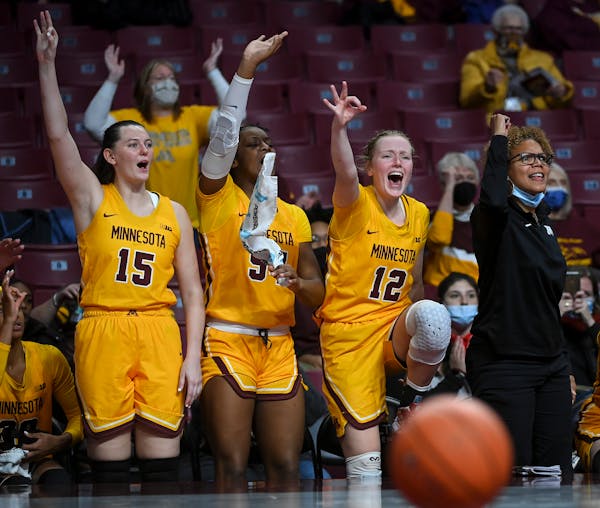 See
more of the story
See
more of the story
Saturday in the Bahamas, the Gophers will play Connecticut in the inaugural Women's Battle 4 Atlantis. The tourney will bring together basketball greats who should remind you of two of the best teams ever assembled.
"Those were dream teams,'' Lynx coach Cheryl Reeve said. "We don't talk about them enough.''
The 2012 and 2016 U.S. women's basketball Olympic teams were infused with Minnesota story lines and almost inconceivable talent.
UConn coach Geno Auriemma coached both. Reeve, who will be scouting the Atlantis tournament for the Lynx, was an assistant coach on both. Gophers coach Lindsay Whalen played on both, along with Lynx teammates Seimone Augustus, Maya Moore and Sylvia Fowles, who joined Minnesota after the 2015 season.
Also in the Bahamas will be South Carolina coach Dawn Staley, who replaced Auriemma as the U.S. Olympic coach and won gold in Tokyo this summer.
And Hopkins alum Paige Bueckers, who was recruited by Auriemma to UConn after the Gophers hired Whalen and Whalen made a late run to keep Bueckers in Minnesota. "Geno got a little nervous,'' Reeve said. "He knew that Paige had a poster of Lindsay in her bedroom. I think he increased the frequency of his visits after Lindsay got hired.''
Bueckers will probably make her Olympic debut in 2024 in Paris. She will become part of the new wave of American basketball, knowing that the old wave won seven consecutive Olympic gold medals while spurring the rest of the world to improve.
The old wave might have been at its best in 2012 in London and 2016 in Rio, during Whalen's two Olympic appearances.
The 2012 team featured Whalen, Augustus, Sue Bird, Moore, Angel McCoughtry, Asjha Jones, Tamika Catchings, Swin Cash, Diana Taurasi, Fowles, Tina Charles and Candace Parker. That team went undefeated, winning by an average of 34.4 points.
The 2016 team made three roster changes: Brianna Stewart, Elena Delle Donne and Brittney Griner for Jones, Cash and Parker. The 2016 team played faster, scored more and won by an average of 37.3 points.
As the head coach in Tokyo, Staley ran a team featuring a number of players who may have played in their last Olympics, facing vastly improved competition. Her team gave the U.S. its seventh consecutive gold medal and ran its Olympic winning streak to 55 games, building an average margin of victory of 16 points.
I covered the 2012 and 2016 Olympics. My strongest memory of those teams: Getting to talk, one-on-one or in small groups, with superstars.
Can you imagine having that kind of access to the 1992 men's Olympic dream team? Casually chatting with Michael Jordan or Larry Bird, with hardly anyone else around?
That's one reason the women's version of the dream team didn't become as famous as a team that included Christian Laettner: a lack of media coverage, and a lack of understanding that it was just as impressive for the women's team to blow out Japan as it was for the men's team to blow out Angola.
The coaching staff featured two people Whalen has called "the best coaches in women's basketball": Auriemma and Reeve.
When Reeve signed on to be a part of USA Basketball, Auriemma approached her and pointed out that she had won "four WNBA titles,'' and that he was just "a college coach.''
Reeve became a fan of Auriemma's sarcastic wit and coaching ability, just as Whalen learned to enjoy freelancing with the second unit of two of the most dominant Olympic teams ever assembled.
"I know Lindsay loved those experiences,'' Reeve said.
This weekend, Whalen will face Auriemma, and Reeve will be watching. They can reminisce. Or they can watch Bueckers and imagine how good the U.S. might be with her running the point instead of Bird and Whalen.



